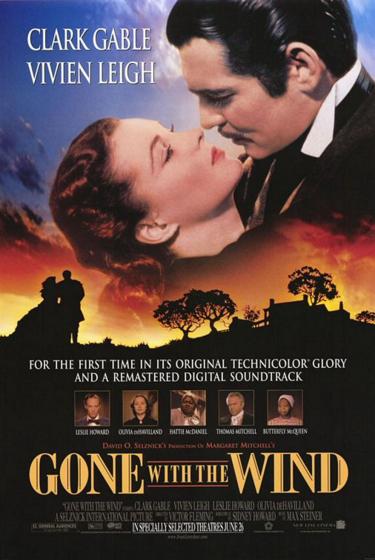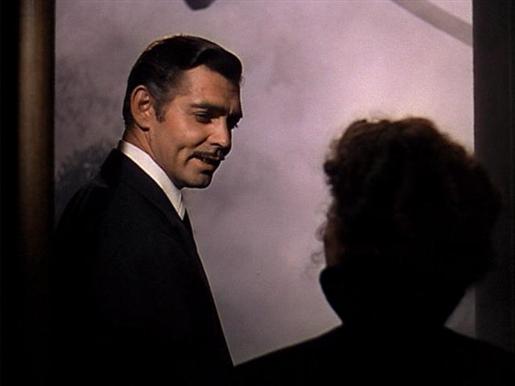Did Gone With the Wind Use the Word “Damn” in Violation of the Motion Picture Association Production Code?
Here is the latest in a series of examinations into urban legends about movies and whether they are true or false. Click here to view an archive of the movie urban legends featured so far.
MOVIE URBAN LEGEND: Gone With The Wind used the line “Frankly, my dear, I don’t give a damn” in violation of the Motion Picture Association Production Code.

Probably the most famous line in Gone With the Wind, which is one of the most famous motion pictures of all-time, is at the end of the film, where Vivien Leigh’s Scarlett O’Hara tries to convince her long-suffering beau, Clark Gable’s Rhett Butler, that she really DOES love him and DOESN’T love Leslie Howard’s Ashley.
Reasonably enough, Rhett is sick of her shenanigans, so he leaves her with the line “Frankly, my dear, I don’t give a damn.”

That pesky “damn” was the cause of a great deal of controversy, but it’s controversy that has been misrepresented over the years.
The Motion Pictures Producers and Distributors Association (MPPDA) (precursor to today’s Motion Picture Association of America (MPAA)) formed the Motion Picture Production Code in 1930, detailing what was and was not acceptable to use in films. The Code existed, in one form or another, until 1968, when it was replaced with the current ratings system that is basically still used today.
The word “damn” would definitely be the type of word that would not be allowed, generally, by the Code.
So the story goes that Gone With the Wind’s producer, David O. Selznick, decided to basically say, “forget you” to the Code and use the word “damn” without their permission, and thereby accept a $5,000 fine.
That is such a simplification of the situation that it basically is false.
To wit, there was no such thing as a movie producer just saying, “Whatever, we’ll just pay the fine.” If the Code did not let you use a word, you were not going to use the word.
And Section Five of the Code said:
Pointed profanity (this includes the words, God, Lord, Jesus, Christ – unless used reverently – Hell, S.O.B., damn, Gawd) or every other profane or vular expression, however used, is expressly forbidden.
Here, though, Selznick worked and worked and worked, using pretty much every argument he could think of, to get the word allowed, including (as reader Charles P. wrote in to mention) adding the word “frankly” at the beginning of the phrase, to soften the “damn” at the end (as “frankly” is not from the Margaret Mitchell novel).
He wrote to the head of (and creator of) the Code, Will H. Hays, in an attempt to overrule the Administrator, Joseph Breen, who seemed intent on disallowing the word. Selznick wrote:
this line is remembered, loved and looked forward to by millions…A great deal of the force and drama is dependent on that word….This word as used in the picture is not an oath or a curse, but a vulgarism, and it is so described in the Oxford English Dictionary.
Selznick also worked in some threats, suggesting that if the word was disallowed, that Selznick would organize a meeting of all the studio heads and perhaps they would change the code themselves.
Ultimately, under pressure from the other studio heads, Hays caved, although he warned them all that this could ultimately bring the Justice Department down on all their heads.
And in fact, in Novemebr of 1939 (Gone With the Wind opened in December of 1939), the Code was actually changed!
As of the November amendment, “hell” and “damn” were still banned, EXCEPT if they:
shall be essential and required for portrayal, in proper historical context, of any scene or dialogue based upon historical fact or folklore … or a quotation from a literary work, provided that no such use shall be permitted which is intrinsically objectionable or offends good taste.
This does not mean that Selznick did not have to pay a $5,000 fine. But if he did, it was only a nominal fee – a face-saving gesture, if you will. He included the “damn” with the approval of the Code.
The legend is…
STATUS: False
Thanks to Chrystopher J. Spicer’s Clark Gable: Biography, Filmography, Bibliographyand most importantly, Leonard J. Leff and Jerald L. Simmons’ The Dame in the Kimono: Hollywood, Censorship, and the Production Code
for the information. And thanks to Charles P. for reminding me of the “frankly” part.
Feel free (heck, I implore you!) to write in with your suggestions for future installments! My e-mail address is bcronin@legendsrevealed.com.






[…] or radio. The first time someone actually used the word “damn” was Clark Gable in Gone With The Wind. The movie company was later fined $5000 by the MPAA for his language.We have seen the rise of […]
Though “Bother it!” I may occasionally say, I NEVER Use a big big D.